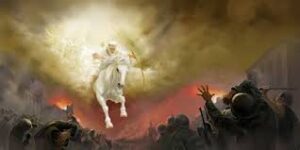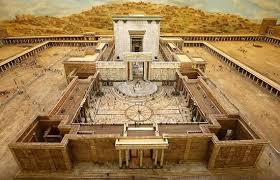Rebellious Isra’el Renewed
Ezeki’el 20: 33-44
Rebellious Isra’el renewed DIG: What is the point of the comparisons in 20:30-32 and the irony in 20:39? How is Isra’el like (or unlike) her father’s? And the nations? What sins of this generation truly provoke the Lord? In what ways will the future judgment of ADONAI be reminiscent of the Exodus (see 20:33-38)? Who is God telling: Go and serve your idols? What will be different about the way the LORD treats this generation from the ones that have gone before (20:40-44)? What, ultimately, will result from the punishment of Ha’Shem? How will God’s particular way of restoring Isra’el show Him to be Adonai ELOHIM?
REFLECT: What do you learn from this passage about ADONAI’s character and His plan of salvation? About God’s permissive will and His perfect will? How do you think the LORD’s mercy and His wrath work together toward the same purpose? Do you see them working together for good in your particular generation? How so? Which could you use more of now: God’s “carrot” or His “stick?” Why?
The tenth of Ab, 591 BC during the eleven-year reign of Zedekiah
Speaking through Ezeki’el, God has dealt with the past, and He has dealt with the present, now He will deal with the far eschatological future. Sometime the future to the dispersion that he promised in the earlier verses of this chapter (to see link click Ew – Rebellious Isra’el Purged), he talks about a different future than the regathering. Isaiah and others had spoken of a worldwide regathering in faith with blessing (see the commentary on Isaiah De – God Is My Salvation, I Will Trust and Not Be Afraid). In other words, a regathering for the Messianic Kingdom. But the regathering Ezeki’el is speaking of here is a regathering in wrath and anger. A regathering in unbelief in preparation for judgment. The prophets spoke of two worldwide regatherings for the Jews. And the best way of distinguishing between the two is that there is first a worldwide regathering in unbelief in preparation for judgment, specifically the judgment of the Great Tribulation, and then a second worldwide regathering in faith/trust/belief in preparation for blessing, specifically the blessing of the Messianic Kingdom. The regathering spoken of here is a regathering in preparation for judgment of the Great Tribulation.
Divine wrath: As surely as I live, declares Adonai ELOHIM, I will reign over you with a mighty hand and an outstretched arm and with outpoured wrath (Ezeki’el 20:33). In the past the mighty hand and the outstretched arm was used on behalf of Isra’el (Exodus 6:6; Deuteronomy 4:34, 5:15, 26:8; Second Kings 17:36). Now, however, it is against Isra’el. And the goal of the judgment was not annihilation, but to make Himself king over them. The goal is the messianic kingship (see the commentary on Isaiah Db – The Nine Missing Articles in Messiah’s Coming Temple). So ultimately, the means by which Ha’Shem will achieve His status as king over Isra’el will be by wrath and judgment.

Divine regathering: I will bring you from the Gentile nations and gather you in unbelief from the countries where you have been scattered by means of judgment, with a mighty hand and an outstretched arm and outpoured wrath. I then will bring you into the wilderness of the Gentile nations and judge you face to face (Ezeki’el 20:34-35). Ultimately, the place of gathering is the wilderness of the Gentile nations. But this location needs to be determined by parallel passages. In Matthew 24:15-16 Jesus refers to the wilderness of the Gentiles as the mountains. In Revelation 12:6, 13-14 it is referred to as the wilderness. In Isaiah 33:16 this place is also a refuge in the mountain fortress. Specifically, Micah 2:12 CJB tells us: I will assemble all of you, Ya’akov; I will gather the remnant of Isra’el, I will put them together like sheep in a pen, like a herd in its pasture – it will hum with the sounds of people, known as Bozrah (see the commentary on Isaiah Kg – The Second Coming of Jesus Christ to Bozrah). This is the judgment of the Great Tribulation. The Jews will not only be regathered by judgment, but also for judgment.
Then Ezeki’el, under the inspiration of the Spirit of God, draws a comparison to the exodus. Moshe brought the whole nation out of Egypt. And ADONAI’s purpose in the wilderness was to accomplish two things. First, to receive the Torah, and secondly, to build a Tabernacle through which the Torah could be maintained. With those two things accomplished, which took one year, they were to proceed into the Promised Land. But when they came to Kadesh Barnea in the Negev at the border of the Land. But before going in Moshe sent in twelve spies, and then they returned ten said there is no way we will be able to take it. They dissuaded the people and there was a massive rebellion. As a result, God pronounced a judgment upon that generation of Isra’el. Those who came out of Egypt would not enter the Promised Land of Isra’el. They would wander for forty years until all those twenty years and older, except for Joshua and Caleb, would die in the desert. So forty years later there was a new nation. Not a nation born of slaves born in Egypt, but a nation born free in the wilderness that was able to enter the Land under Joshua.
What God did at that time He will do again in the future after the regathering at Bozrah. As I judged your ancestors in the wilderness of the land of Egypt, so I will judge you during the Great Tribulation, declares Adonai ELOHIM (Ezeki’el 20:36). Zechariah 13:8-9 tells us that two-thirds of the Jews will be struck down and perish; yet one-third will be left in it. This third I will put into the fire; I will refine them like silver and test them like gold. They will call out and I will answer them; I will say, “They are My people” and they will say, “ADONAI is my God.”
Ha’Shem then states the purpose of this judgment: I will take note of you as you pass under My rod of judgment, and I will bring you into the bond of the Covenant. As the selected sheep are dedicated to the Temple, so the Israelites who pass under God’s rod (Leviticus 27:32) will be set apart for the purposes of YHVH once again, and under the New Covenant whereby Isra’el will be a holy nation (see Eo – The Days are Coming, declares the LORD, When I Will Make a New Covenant with the People of Isra’el). I will purge two-thirds of those who revolt and rebel against Me. Then Ezeki’el ends with a summary statement of all that he has said so far. Although I will bring them out of the wilderness of the Gentile nations where they are living, yet two-thirds will not enter the Messianic Kingdom. Then you will know that I am the LORD (Ezeki’el 20:37-38). Therefore, just as the rebels were purged in the wilderness while the others entered the Promised Land under Joshua, so here, two-thirds of the rebels will be purged in the Great Tribulation and one-third will enter the Millennial Kingdom under the Kosher King.293
A parenthetical warning to Ezeki’el’s generation: This contrasts the present generation from the future generation of verses 33-38. As for you, people of Isra’el, this is what Adonai ELOHIM says: Go and serve your idols, every one of you! Have your fill. See what that gets you (Ezeki’el 20:25)! But afterward you will surely listen to Me and no longer profane My holy name with your gifts and idols (Ezeki’el 20:39).

God’s far eschatological provision of the Messianic Kingdom: For on My holy mountain of Tziyon, the high mountain of Isra’el, declares Adonai ELOHIM, there in the Land all the people of Isra’el will serve Me, and there I will accept them. The prophet mentioned this high mountain previously (Ezeki’el 17:23). This mountain doesn’t exist today. It will come into existence when the topography of the earth is changed during the millennium. A new mountain will emerge from that transformation to become the highest mountain in the world. On the northern part of this mountain will be the millennial Temple and on the southern part will be millennial Jerusalem. What Ezeki’el says here, he will elaborate in much greater detail in Chapters 40-48 (see Gs – God Shows a Vision of the Millennial Temple).
The worship during Ezeki’el’s day, contaminated with idolatry, will be discarded; and the true worship, acceptable to God, will come into its own when the scattered house of Isra’el is saved. Not only will this high mountain be the place where Messiah will rule, it will also be the place where the millennial worship will be conducted. There I will require your offerings and your choice gifts, along with all your holy sacrifices (Ezeki’el 20:40). There will be a sacrificial system in the Kingdom. It will be a memorial like communion is in the Church today: Do this in remembrance of Me (Luke 22:19). It will not be a reiteration of the Mosaic system since it is now gone forever. But it will be different, sometimes even contradicting the TaNaKh, because it will be based upon new millennial law.
Isra’el is to be regathered in faith. Here ADONAI makes three promises. First, they are regenerated: I will accept you. All Isra’el will be saved (Romans 11:26). Second, they are regathered: as fragrant incense when I bring you out from the countries where you have been scattered. And third, they are sanctified: I will be proved holy through you in the sight of the [Gentile] nations (Ezeki’el 20:41). After having God’s name profaned because of the captivity of His people in the eyes of the Gentile nations of the world, the restoration of Isra’el will serve to make the divine name holy in their sight.
Then you will know that I am the LORD, to the fullest extent when the final restoration of Isra’el comes, when I bring you into the Land of Isra’el, the Land I had sworn with uplifted hand to give to your ancestors (Ezeki’el 20:42). It will be evident beyond all doubt that the mighty hand of God had restored them to their Land, and the Israelites will have to acknowledge that He, and none other, is YHVH.
There you will remember your conduct and all the actions by which you have defiled yourselves, and you will loathe yourselves for all the evil you have done (Ezeki’el 20:43). They will see their sin in all its stark reality for what it really is: suicide of the soul. And they will repent. They recognize their past sins and they turn away from those sins. But the reason that God will do all these things is the same reason that He had preserved Isra’el in the past. The preservation of the LORD’s name. You will know that I am ADONAI, when I deal with you for My name’s sake and not according to your evil ways and your corrupt practices, you people of Isra’el, declares ADONAI (Ezeki’el 20:41-44). Because He is the Covenant Keeper, Isra’el’s final restoration is guaranteed.294



Leave A Comment